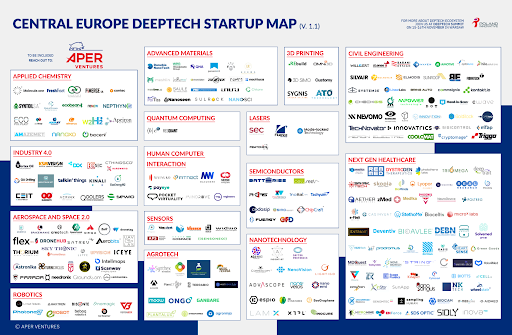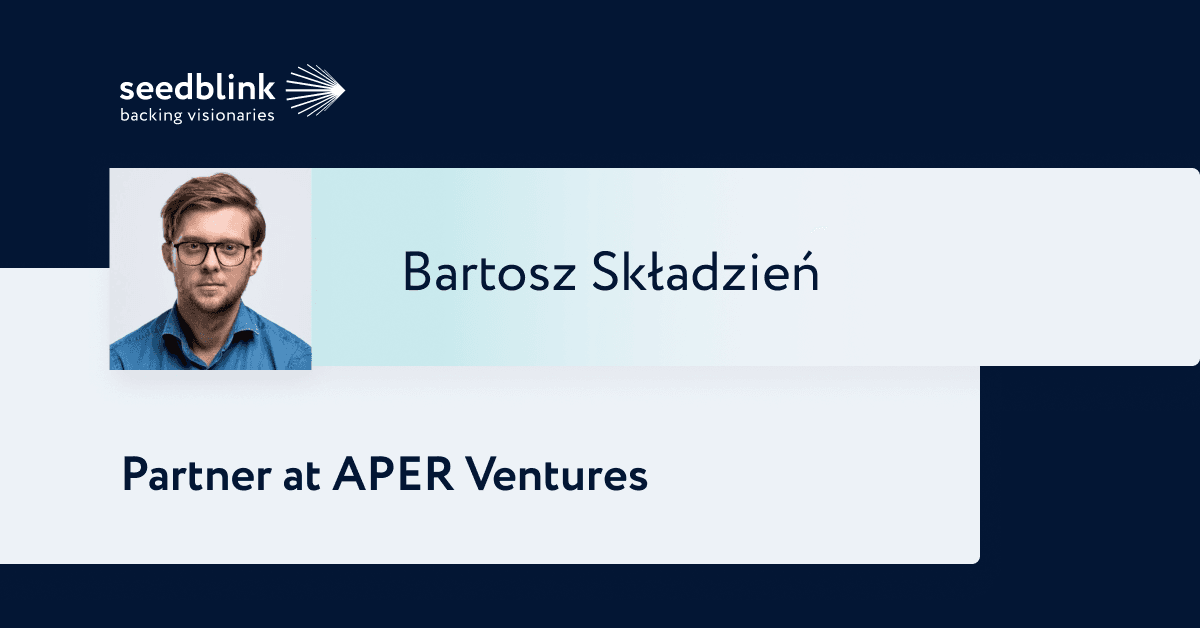SeedBlink Blog
interviews
The evolution of deep-tech in CEE - in discussion with Bartosz Składzień
Meet Bartosz Składzień, Partner at APER Ventures, a VC fund focused on deep-tech and hardware startups in Poland and CEE. Let’s discover with Bartosz the regional deep-tech ecosystem and what you should know about it before your next deals.
While travelling around European ecosystems, we discovered APER Ventures from Poland. Right when we were learning more about their mission and portfolio, they launched The Central & Eastern European Deep-Tech map.
So, what better moment to sit down & have a look at the evolution of deep tech in our region? This is why we invited Bartosz Składzień to join us for a talk and draw a picture of what investors should know about deep tech in CEE.
In this interview, you will learn the following:
- Who is APER Ventures & why is it investing in deep tech?
- What Does The Central & Eastern European Deep-Tech map look like?
- Why CEE has a strong technical background & is it the right place for multiplying deep-tech ideas?
- Deep-tech trends to remember before your next funding round.
Who is Bartosz Składzień & APER Ventures
Bartosz Składzień is a Partner at APER Ventures, a Poland-based venture capital fund that invests in deep-tech and hardware startups in Poland and CEE. At APER Ventures, Bartosz is responsible for managing the operational and investment processes of the Fund. At the same time, he is a supervisor of APER’s portfolio companies as a board member.
APER has focused on deep tech since day one, a clear strategy that can be followed across their previous funds and through their activity as META Ventures. The fund is a result of the professional passion and experience of Bartosz, Jacek Błoński, Piotr Sławski, and Luigi Amati, who have previously raised and invested in Polish and foreign markets.
Right now, Bartosz and his colleagues are working to invest a fund of around 27M EUR. They already have five investments in their portfolio and are actively looking for new deals in 2023. The fund has a unique co-investment model of operation, welcoming other investors, business angels, family offices, or private companies to tag along in the investment process with them.
“Our first fund was called META Venture and was co-founded with our partners from META Group. META Group is an Italian company looking to support entrepreneurs with a strong vision and ambition to develop large, global companies.”
Deep-Tech industry - a journey from Poland to CEE
“Education is one of the factors driving the success of the deep-tech sector in Poland and many other countries in the CEE. Therefore, our country is the biggest market, with most solutions coming from Advanced Materials and Applied Chemistry. Other areas include MedTech and various innovative use cases in Civil Engineering.”
But what does it mean to launch a deep-tech startup in CEE?
Bartosz shares with us some of the main things to have in mind as both founder and investor:
“Launching a deep-tech startup in a country like Poland is a two-edged sword.
One approach is to launch right now and consider something other than worldwide sales in terms of circumstances. Bigger countries offer the option to test your idea locally and expand beyond borders later on.
On the other side, founders from smaller markets like Slovakia don’t have that luxury of having a big market and have to start thinking about the product internationally right from the start.”
The Central & Eastern European Deep Tech Map
In 2022, APER Ventures launched the first edition of the Central & Eastern European Deep Tech Map that places startups in this industry in a more visible perspective.
Here is a glimpse of how the ecosystem looks like from a startup perspective:

Source: APER Ventures
“We have decided to launch The Central European Deep-Tech Startup Map to connect the dots within the ecosystem. A visual representation makes it easier for investors and people interested in deep-tech startups to spot the main ecosystem players.
After just one edition, the map sparked many conversations, and we had quite positive feedback.”
Going forward, let’s discover with the help of Bartosz which countries in CEE play a significant role in the development of deep tech. There are over 265 deep-tech startups in the region, with the most active ones in:
- [162] Poland
- [39] Hungary
- [38] Czechia
- [26] Slovakia
“Czech and Slovakia had a pretty good year in 2022, counting down a few mega-rounds and successful startups.
A lot of startups in the deep-tech sector are gaining traction, and the industry, alongside sustainability, is the most growing vertical in terms of VC spending in Europe.”
Deep-Tech trends in CEE
New records in deep-tech investments despite the global and regional downward
In 2022, Central & Eastern European countries had good momentum with deep-tech startup funding. The ecosystem counted a total of EUR 303M invested in the sector, with Nomagic and The Batteries rounds taking the highest rounds. From Bartosz, we also find out that Polish and international VCs took part in more than 300 rounds, bringing more than EUR 1BN in total funding in the past 5 years.
“The world had a difficult year in VC funding, but Poland managed to stay at the same level of investments. We had PLN 3.6 BN (EUR 0.76BN) invested in local startups from a total of 245 funds in 2022.
If we look at deep-tech, the sector hit new records in both Poland and the whole Central and Eastern European region.”
High interest in CEE for deep-tech solutions
“In our region, people are more interested in complex kinds of developments and technical solutions rather than fewer tech trends.
For example, Poland is not really into NFTs and has quite a negative sentiment.”
Education - one of the leading factors in supporting deep-tech growth
Countries in CEE are well-known for having a great educational background in technical areas.
Poland
“Poland is a very good example of chemistry because of our strong educational background in this area in Polish universities.
Our local ecosystem is also pretty strong in mathematics, tech, and civil engineering. Graduate students from universities and programs are well-prepared to enter the workforce and make valuable contributions to this field.”
Hungary, Slovakia, Czech Republic, Bulgaria, and Romania are other countries in the region creating successful startup stories.
Hungary
“Hungary has a strong focus on med-tech, a sector growing very fast in the last year. The local market offers great opportunities in this field to create innovative health therapies and solutions, dental care equipment, and many other ideas that increase hospital efficiency.
This healthcare sector is followed closely by semiconductors that drive fast foreign direct investments.”
Czechia
“Another country having a strong industry presence with great skills in areas like aerospace, or human-computer interaction, for example.
Czechia is one of the leading places that foster innovation in aerospace and is home to companies such as Honeywell, GE Aviation, Siemens, and many others. Some of these invested highly in R&D and pushed the country into the first positions in this industry.”
High government support for the tech sector in CEE
The growth of these countries, in most cases, has also been supported by their local government, and after years of development have reached the status of emerging hubs.
“CEE is a good place for deep-tech startups compared to Western countries. Local government is also supportive and takes numerous initiatives to promote the development of this sector.”
Regional success stories and future unicorns
CEE doesn’t have any deep-tech unicorns yet but has a few success stories holding a strong potential to win this title in the near future.
Between 2013 - 2019 a few innovative ideas came to life, now dominating the local market, according to Bartosz.
Some of the major funding rounds in 2022 were represented by companies like:
- ICEYE (€140M)
- Nomagic (€23M)
- Talkin’ Things (€21M)
- Linear Labs (€18M)
- Codasip (€15M)
- Sunroof (€15M)
- Nevomo (€15M)
- GA Drilling(€12M)
- The Batteries (€7M)
- Apeiron Synthesis (€5M).
The round raised by ICEYE of a total of USD 136M in Series D became one of the most significant ones in the sector in CEE. Thanks to this round, the company will continue to develop advanced satellite imaging solutions and support the Ukrainian government in the war against Russia.
These significant rounds it’s definitely pushing the company towards the round of becoming the first unicorn in the deep-tech sector.
Your key takeaways:
- Eastern European countries are keen to develop a more technical solution rather than soft ideas.
- Local governments in these countries support the tech sector and launch constant initiatives to power up further developments.
- Universities and educational backgrounds is supporting founders in nurturing their knowledge base and skills.
- ICEYE — the most promising startup holding the potential to become the first deep-tech unicorn.
Resources mentioned in the discussion.
Connect with Bartosz:
Companies mentioned:
- ICEYE
- Nomagic
- Talkin’ Things
- Linear Labs
- Codassip
- Sunroof
- Nevomo
- GA Drilling
- The Batteries
- Apeiron Synthesis
Other resources:
Join our newsletter
Your go-to source for European startup news, equity trends, VC insights, and investment opportunities.
